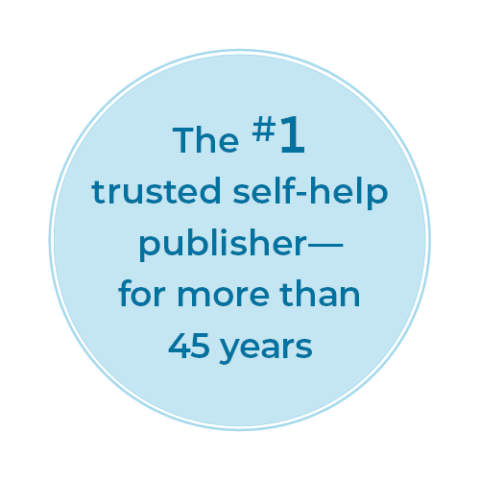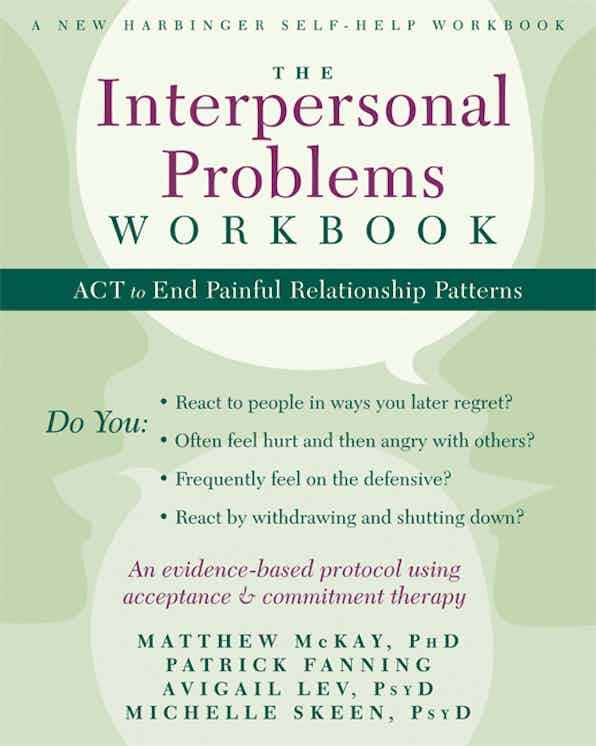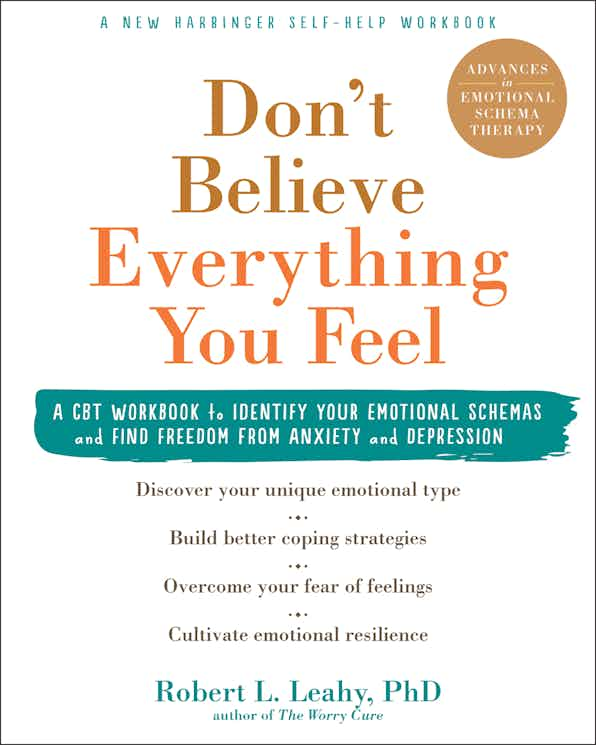Schema-Focused Relationship Problems
A schema is a strongly held belief that a person has about himself or herself, about other people, or about the world in general, and the belief can be either positive or negative in nature. In all cases, the schema is accepted as being true, even if it’s negative and causes harm or difficulties in the person’s life. A schema-focused relationship problem is a pattern of difficulties a person has with others that is caused by these negative beliefs. The theme of these problems often remains the same over time and repeats itself in different types of relationships, including romantic involvements, business relationships, and friendships.

Most often, negative schemas develop at an early age. Children hold beliefs about themselves that they learn from their parents and other adults. For example, children who hears judgmental messages such as “You’re lazy” or “You’re stupid” will begin to think that these things are true and grow up to be adults who think they are lazy, stupid, or generally incompetent.
Similarly, children who are abused, mistreated, or criticized often think they’ve done something sufficiently bad to deserve their mistreatment—regardless of the fact that none of these unkind comments or actions is deserved. Nevertheless, these children often think poorly of themselves as a result, and may develop the belief that everyone will mistreat them. As adults, these same people continue to think poorly of themselves and their negative schemas continue to grow stronger. Sadly, if left untreated, negative schemas don’t change very much throughout life; instead, they continue to be harmful to the person’s self-esteem and relationships.
Psychologist Jeffrey Young, a leading researcher on schemas, has defined eighteen common negative schemas that develop early in life.
1. Abandonment or instability. People who have this schema are constantly afraid of relationships ending. They may believe that their relationships will end easily due to fights, breakups, divorces, affairs, or death. Or they may believe that anyone who would want them must be physically, mentally, or emotionally unhealthy, and will therefore be unable to take care of them.
2. Mistrust or abuse. People who have this schema are constantly afraid of being physically or emotionally hurt by other people, through direct physical force, deceptions, or lies. They might even believe that other people do this to harm them on purpose.
3. Emotional deprivation. People with this schema believe that they will never get the care and support they need.
4. Defectiveness or shame. People with this schema believe that they are physically, emotionally, or psychologically defective, and therefore unworthy of being loved or cared for by anyone.
5. Social isolation or alienation. People with this schema believe that they are so different from everyone else in the world that they will never be able to fit in or be accepted.
6. Dependence or incompetence. People with this schema believe that they are incapable or not smart enough to do anything without great assistance from other people.
7. Vulnerability to harm or illness. People with this schema believe that they are exceptionally at risk for getting hurt or contracting some type of disease or illness.
8. Enmeshment or undeveloped self. People with this schema believe that they can’t live or enjoy life without the constant emotional support of someone else, usually someone of great importance their life, like a parent or spouse. In some instances, the person doesn’t even feel whole without that other person close by.
9. Failure. People with this schema believe that they have never succeeded, nor can they ever succeed, no matter what the task.
10.Entitlement or grandiosity. People with this schema believe that they are more important than other people and therefore more deserving of privileges and rewards not given to others. People with this schema may seek fame, power, or control at the expense of the safety and needs of others.
11. Insufficient self-control or self-discipline. People with this schema are unable to tolerate any type of discomfort or setback when trying to achieve something, and so they simply give up. Alternatively, they may be unable to control their emotional outbursts and impulses.
12. Subjugation. People with this schema feel they are constantly forced to give up their own needs by others, who threaten to do something or withhold something if the person with this schema doesn’t comply.
13. Self-sacrifice. People with this schema willingly give up their own needs in order to meet someone else’s needs. Often, they feel guilty and are afraid that if they don’t meet the needs of the other person, that person will suffer in some way.
14. Approval seeking or recognition seeking. People with this schema are constantly trying to gain the appreciation and support of others. As a result, they fail to develop a sense of valid self-worth, because all of their value is dependent on what other people think of them.
15. Negativity or pessimism. People with this schema only pay attention to the sad and difficult parts of life, such as troubles, grief, pain, destruction, and the loss of life. They also fail to see, or purposely ignore, anything good that might be taking place; plus, they usually expect that the worst will happen.
16. Emotional inhibition. People with this schema stop themselves from saying, doing, or feeling certain things that that they fear might bother or offend someone else. In essence, they “stuff” all of their true feelings and opinions to satisfy other people.
17. Unrelenting standards or excessive criticism. People with this schema set excessively high goals for themselves that are often impossible to meet or very damaging to the rest of the person’s life. They also strive to do everything perfectly, and anything short of that, even 99 percent perfection, is considered a failure.
18. Punitiveness. People with this schema believe that anyone who makes an error, large or small, should be criticized or disciplined. They are also quick to get angry with others, as well as with themselves, and they fail to consider reasonable circumstances that could explain why the error was made.
Most people recognize that they’ve dealt with at least one of these negative schemas at some point in their lives. And if they’re still struggling with one or more of these schemas, it’s easy to understand why they might be having difficulties in their relationships. Living with a negative schema is similar to looking at oneself in a distorted fun house mirror every day. At first, it might have been hard for the person to believe that he or she really looked that way, but after seeing it often enough, the person started to believe it. Schemas are so strong that even when reliable and good-natured people tell the person that these negative things are untrue, the person still doesn’t believe them. That’s because each time the person is alone and thinks of himself or herself, the person still sees that familiar distorted view of the schema.
Negative schemas greatly affect the way people behave and interact with others. As a result, schemas are often blamed for three types of behaviors that interfere with relationships. The first type of schema behavior is schema maintenance. This refers to the actions people take to preserve the power of their negative schemas, even when those actions make them feel worse about themselves and their relationships. For example, a woman with a self-sacrifice schema is constantly giving up her own needs for the needs of other people. She probably picks romantic partners who are very demanding and controlling. As a result, she never gets any satisfaction in her relationships and probably spends all of her free time helping other people.
The second way in which schemas often disrupt relationships is through schema compensation behaviors. In this process, people behave in the exact opposite way of what the schema demands of them. To continue with the previous example, a woman who has a self-sacrificing schema might suddenly get angry at other people and refuse to help anyone ever again. Naturally, this extreme opposite reaction will shock the people in her life, who are accustomed to her doing everything they want her to do, and so it will certainly disrupt many of her relationships.
Finally, the third way in which schemas affect relationships is through pain avoidance behaviors. Simply put, all negative schemas have unspoken rules, and when a rule is broken it causes frustration and pain. To avoid this, people will do anything to not break the rules; and again, most of this happens on an unconscious level. For example, the rule of a self-sacrificing schema says, “If you do anything for yourself, you’re selfish and hurting somebody else.” As a result, the person never does anything for himself or herself and tries not to break the rule. But as a result of not wanting to hurt someone else, the person never gets any of his or her own needs met. In the worst-case scenario, the person might even stay in a dysfunctional or dangerous relationship because he or she doesn’t want to upset the other person by leaving. Unfortunately, surrendering one’s decision-making power to avoid immediate pain and discomfort actually increases the strength of the negative schema and makes it harder to change that schema in the future.
Yet, despite these rules and a person’s best efforts to obey them, schemas are still a source of great pain and disappointment in many people’s lives. There will always be events that will trigger a person’s schemas, despite the person’s best efforts to control those situations. For example, a man with a schema of defectiveness might do his best to avoid all circumstances that make him feel like he’s substandard, but he’s still likely to encounter situations in which he’s criticized, whether it’s by family members, coworkers, or even strangers. And when events like these take place, he will still feel very sad, angry, or distressed. Similarly, a woman with an abandonment schema might try very hard to make sure that people never leave her, such as by sacrificing all of her own needs for the sake of making people stay, but it’s still impossible for her to stop people from leaving her. Whenever a friend declines an offer to socialize or her boyfriend tells her that he has to go home, her schema will still get triggered, and she’ll feel upset, scared, or angry.
There are no official estimates of rates of other related disorders for people with schema-focused relationship problems. However, psychological research and theory have demonstrated that dysfunctional schemas account for many problems, such as depression, drug and alcohol problems, anxiety problems, eating disorders, and personality disorders.
There are no official estimates of how many people are affected by schema-focused relationship problems. However, it seems obvious that everyone has a unique collection of both helpful and dysfunctional schemas that govern their lives and relationships.
The preceding information about schema-focused relationship problems is based on the theory of psychology found in cognitive behavioral therapy and schema-focused therapy. Other clinicians from different schools of psychotherapy will have different ideas about what causes conflicts in a relationship.
Using the schema model, however, it’s clear that the dysfunctional schemas are the problem. They repeatedly make people think and feel the same way about themselves, others, and the world, whether or not those judgments and conclusions are correct or helpful. Moreover, most people tend to develop at least one dysfunctional schema when they are young. As a result, relationships can be very complex. Each person enters a relationship with his or her own negative schemas, which means there are two active groups of schemas in each relationship, not just one.
Both cognitive behavioral therapy and schema-focused therapy can improve these types of relationship problems. Cognitive behavioral therapy can help a person identify and test the rules of the schema, in a safe and systematic way, in order to see what the effect is on the person’s relationships. In addition, it helps people challenge the truth of their schemas by looking for evidence that contradicts them, and also helps people replace pain avoidance behaviors with new skills to handle confrontation.
Schema-focused therapy uses some of the same methods. Plus, it uses imagery techniques to uncover suppressed emotions, and interpersonal techniques to highlight just how a person’s schemas affect his or her relationships. In some cases, treatment can be effective even if just one person from the relationship seeks help. In other cases, a couple may need joint or family cognitive behavioral therapy.
Many people in troubled relationships have also found help using other psychological treatments, especially emotionally focused therapy, couples therapy, and family therapy.
Cognitive behavioral therapy (CBT) is a form of treatment that combines elements of both cognitive therapy and behavior therapy. Cognitive therapy examines the way people’s thoughts about themselves, others, and the world affect their mental health. Behavior therapy investigates the way people’s actions influence their own lives and their interactions with others. By combining the two, CBT examines the way people can change their thoughts and behaviors in order to improve their lives.
The CBT treatment for schema-focused relationship problems is often composed of six steps:
- Conduct an assessment and provide education
- Identify the consequences of the schema
- Identify evidence from the past
- Test the rules of the schema
- Strengthen new core beliefs
- Prevent relapse
Step 1: Conduct an Assessment and Provide Education
The first step of the CBT treatment for schema-focused relationship problems is for the person to understand the basic nature of schemas and the types of interpersonal problems they can cause (as highlighted above). It’s also important for people to understand that CBT is an active form of treatment that requires them to do work outside of the therapy session.
Next, the person should identify his or her schemas. This can be done by conducting an assessment using a tool such as the Core Beliefs Inventory or a monologue diary.
Step 2: Identify the Consequences of the Schema
Challenging and changing schemas is often difficult work. Many people have been living with the same schemas for their entire lives. Yet despite the difficulties these schemas might cause, they are familiar. And sometimes living by the rules of a familiar schema feels safer and more predictable than making changes. For these reasons, it’s often helpful to begin the process of changing schemas by identifying the positive and negative consequences of that schema. Looking at both the benefits and the liabilities of their schemas often gives people motivation to follow through with the treatment. It often helps to use a tool such as a consequences chart, which looks at the impact of schemas on various aspects of a person’s life.
Step 3: Identify Evidence from the Past
Again, many people’s schemas have existed since they were children. Therefore, an important part of the CBT treatment for schema-focused relationship problems is to look for evidence throughout a person’s life that both supports and refutes the truth of the schema.
It’s often easier for people to remember events that support a negative schema, so it can take more work to think of events that refute the schema. For example, if a man had a schema of incompetence, it might be easier for him to think of things that he messed up or did incorrectly than things that he did correctly or even perfectly. But by remembering these other events and the evidence they provide to refute the schema, the schema begins to loosen its hold on the person’s life. The schema can’t be 100 percent true if contrary evidence exists.
Looking for early evidence of the schema can also help in the process of challenging the schema. Often, people have early memories of the schema being correct, such as “When I was five years old, I did make a lot of mistakes and I was clumsy.” But this often involves neglecting to look at their behavior in other ways. For example, sometimes their behavior may have been appropriate for their age at the time, while in other situations they might not have had a choice about their behavior, for example, if they were controlled by someone else, like an adult.
Step 4: Test the Rules of the Schema
The rules of a schema keep the schema functioning because they help the person avoid catastrophic situations in which he or she doesn’t feel capable of coping. For example, the man who has a schema of incompetence might have the following rules: “I should never volunteer to help others, because I’ll only mess up their lives,” “I should keep my opinions to myself, because they’re probably wrong,” and “I shouldn’t contradict my girlfriend, because I’ll just make her angry.”
The fourth step of the CBT treatment for schema-focused relationship problems is to identify these rules. Then, once they’re identified, the person can begin testing the rules in a safe and systematic way in order to determine if the predicted catastrophes occur. First, the person should pick a situation that causes minimal fear. Then the person should rehearse how he or she is going to behave in a healthier, more positive way—in a way that contradicts the rules of the schema. And, finally, the person should record if the predicted catastrophe occurred, and if not, what happened instead. For example, the man with a schema of incompetence can set up a situation in which he offers his opinion about some subject to his friends. He might make the prediction that he will upset them. Then he engages in the situation, offers his opinion, and notices what happens. Most of the time, the person’s fears are worse than what really occurs. The goal is to accumulate a history of new experiences that refute the old schema, and thus diminish the power of the schema.
Step 5: Strengthen New Core Beliefs
It’s not enough to disprove old, dysfunctional beliefs, however. The person also needs to create new, healthier beliefs about himself or herself. For the man with a schema of incompetence, he might create a new belief, such as “I often do things very well.” Then he can create new rules for himself based on this schema and test these rules in his daily life. Often, it helps to keep an evidence log, recording situations that support this new healthier view oneself.
Then, once new beliefs have been established and tested, a person might also find it healing to reexamine situations from the past using visualization skills. Visualization can help restructure memories from the past and help relieve the sting of painful memories.
Step 6: Prevent Relapse
Finally, the last step of the CBT treatment for schema-focused relationship problems is preventing relapse after treatment is complete. Changing people’s beliefs about themselves is challenging work, but it’s not impossible. It takes dedication and a good plan, like the one offered in this treatment. The key to relapse prevention is for the person to continue using the cognitive and behavioral skills learned in treatment and to recognize the early signs of returning schema-related problems. Then the person can take steps to prevent those problems from redeveloping.
Disclaimer
This website is for informational purposes only and does not provide an official diagnosis. Anyone struggling with a physical or mental health problem should seek the services of a medical or psychological professional as soon as possible. Furthermore, if you’re having thoughts about suicide or hurting someone else, please see our crisis resources list, contact your local emergency services, or go to a local hospital immediately.





